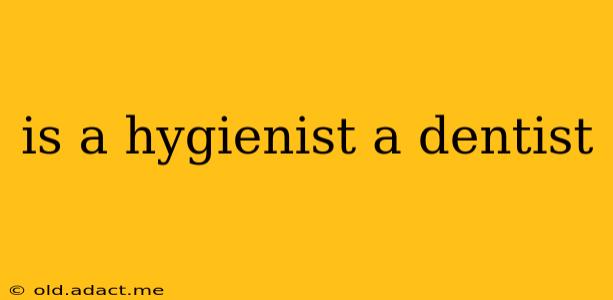Is a Hygienist a Dentist? Understanding the Differences
No, a dental hygienist is not a dentist. While both work in the dental field and collaborate closely, they have distinct roles, educational requirements, and scopes of practice. Understanding the difference is crucial for patients seeking appropriate dental care.
What does a dentist do?
Dentists are licensed medical professionals who diagnose, treat, and prevent diseases and conditions of the teeth, gums, and mouth. Their responsibilities include:
- Diagnosing oral diseases: Identifying cavities, gum disease (periodontal disease), oral cancer, and other oral health problems.
- Performing complex procedures: Extractions, fillings, root canals, crowns, bridges, dentures, implants, and orthodontics (braces).
- Developing treatment plans: Creating comprehensive plans to address patients' oral health needs.
- Prescribing medication: Prescribing antibiotics, pain relievers, and other medications as needed.
- Managing patient records: Maintaining accurate and up-to-date patient records.
What does a dental hygienist do?
Dental hygienists are licensed healthcare professionals who focus on preventative oral care. Their primary role is to help patients maintain optimal oral hygiene. Key responsibilities include:
- Cleaning teeth: Removing plaque and tartar buildup from teeth and gum lines.
- Providing oral health education: Educating patients on proper brushing, flossing, and dietary habits.
- Applying sealants: Applying protective sealants to prevent cavities in children's teeth.
- Taking x-rays: Taking and developing dental x-rays to assist dentists in diagnosing oral conditions.
- Administering fluoride treatments: Applying fluoride treatments to strengthen tooth enamel and prevent cavities.
What are the educational requirements?
The educational pathways for dentists and hygienists differ significantly:
- Dentist: Dentists must complete a four-year Doctor of Dental Surgery (DDS) or Doctor of Dental Medicine (DMD) degree after earning an undergraduate degree. This involves extensive training in various dental specialties.
- Dental Hygienist: Dental hygienists typically earn an Associate's or Bachelor's degree in dental hygiene, followed by licensure examinations. Their education focuses on preventative care and clinical skills related to cleaning and oral health education.
Can a hygienist perform the same procedures as a dentist?
No. Dental hygienists work under the supervision of a dentist and cannot independently diagnose or treat dental diseases. Their scope of practice is limited to preventative measures and assisting the dentist in providing comprehensive care.
What is the difference in job responsibilities?
The core difference lies in their responsibilities. Dentists are responsible for diagnosis, treatment, and complex procedures, while hygienists focus on preventative care, patient education, and assisting dentists in their work.
How do dentists and hygienists work together?
Dentists and hygienists work as a team to provide comprehensive oral healthcare. The hygienist's work is crucial for early detection of problems, and their preventative measures significantly reduce the need for more extensive dental treatments performed by dentists. They often work together to ensure the best possible outcome for patient oral health.
In summary, while both are vital members of the dental healthcare team, a dental hygienist is not a dentist. They have distinct roles, training, and legal scopes of practice. Understanding these differences is essential for seeking and receiving appropriate care.
